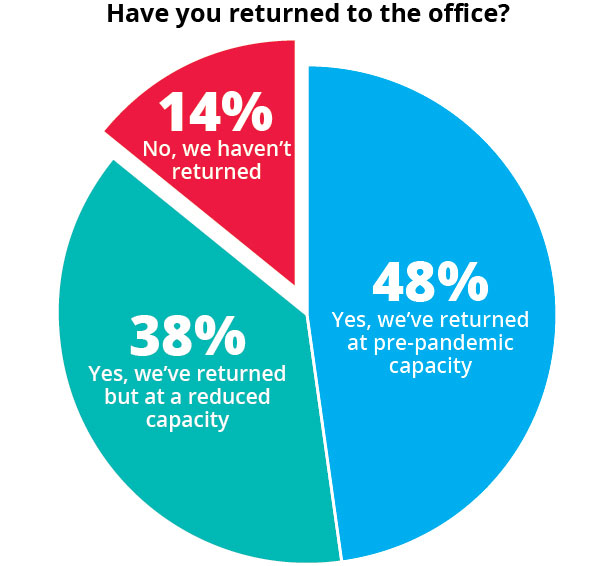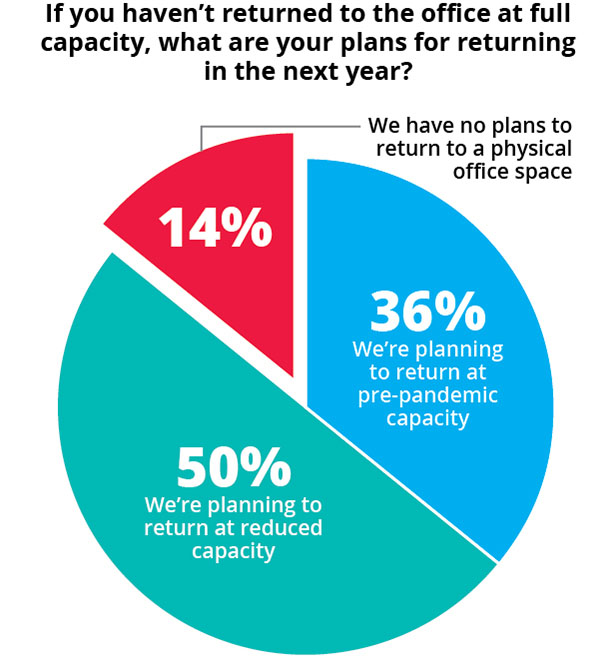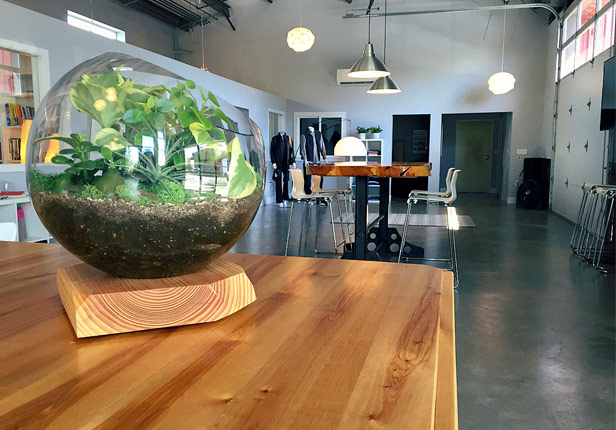May 24, 2021
Promo’s Return to the Office
Though few companies plan to give up their office space completely, many are exploring the possibility of a hybrid model that gives employees the flexibility they crave.
Earlier this month the CDC relaxed masking guidelines for the fully vaccinated – a change that has paved the way for workers across the country to return to the office, if they hadn’t already done so. In many ways, however, the coronavirus pandemic has permanently altered the landscape of work – with more employers making remote and hybrid opportunities a fixture of company culture.

And for many employees, remote work opportunities are becoming less of a perk and more of a requirement. A survey by professional network Blind reported that 64% of workers at the biggest companies preferred permanent work-from-home over a $30,000 raise. (In ASI Media’s admittedly unscientific recreation of the poll, the results were decidedly different, with the vast majority of Twitter poll respondents opting for cold, hard cash over the comforts of a home office.)
A recent survey found that many employees at some of the largest companies would forego a big pay raise in favor of permanent remote work. Which would you choose?
— Theresa Hegel (@TheresaHegel) May 18, 2021
When ASI Research surveyed promo products salespeople in 2019, 26% of respondents chose an enjoyable workplace environment and culture as their number-one job attribute, followed closely by high compensation (25%) and strong work/life balance (23%).
The bottom line? In a post-pandemic world, flexible work arrangements have a lot of appeal for a wide range of workers.
“I never want to go back to a five-day weekly commute, even though I only work about 15 minutes away,” says Jason Storms, account manager at Printcbf in Cedar Knolls, NJ. “I don’t mind commuting whenever it’s needed, but I just think it’s a bit unnecessary to have to come in every day. The companies that refuse to change will have a hard time adjusting to the new standard.
“I wouldn’t take a new job unless they stated I could work remotely,” Storms says.
Brayden Jessen, owner of Zome Design (asi/366115) in Spokane, WA, has also noticed that job seekers crave flexibility. The decoration shop had several ads out for full-time employees, but didn’t get responses until it mentioned that part-time work was also available.
“Right now, I see employees having a lot of leverage on companies,” Jessen says. “Companies are having to be more adaptable to how employees want to work. People have gotten used to being at home, having a more flexible schedule with kids, dogs, running errands, working out, etc., and they want to continue that lifestyle without being tied to a desk 8-5. If companies can adapt to that, maybe we’ll have a much happier, productive workforce.”
The tech world in particular has welcomed the idea of fully remote work. Last year, Dropbox announced that it would become a “virtual first” company and embrace “nonlinear workdays” that allow employees to design their own schedules. Facebook and Twitter continue to embrace remote work. Spotify has a work-from-anywhere policy that lets its 6,550 employees choose whether they want to be in an office, remote or at a coworking space that the company will pay a subscription for. Employees will also have more choice over the city, state or even country where they want to work.
“This is an opportunity to scrap the idea that big cities were the only places where meaningful work can happen because we know firsthand that isn’t true,” Travis Robinson, head of diversity, inclusion and belonging at Spotify, told Insider.
At the opposite end of the spectrum are sectors like finance, which have largely rejected the notion that work-from-home is the new normal. David Solomon, CEO of Goldman Sachs, called remote work an “aberration” that needs to be fixed “as quickly as possible.” Jamie Dimon, CEO of J.P. Morgan Chase & Co, said remote work makes building “culture and character” nearly impossible and limits the kinds of impromptu collaboration and innovation that often happens before or after formal meetings.
Embracing Hybrid
In the promo products industry, about 48% of companies have returned to the office at their pre-pandemic capacity, with another 38% back in the office at a reduced capacity, according to ASI research. Only about 14% of promo firms have not yet returned and have no plans to do so in the next year.


In both the survey results and email responses to ASI Media, it’s clear that promo companies are embracing a variety of approaches, including full returns to the office. And though fully remote staffs are rare for promo companies, many industry leaders say they are more open to hybrid setups – where some employees are remote at least some of the time and others stay in the office.
Many suppliers and decorators with production facilities and warehouses have been back to the office for many months, especially if they were initially designated essential. Richardson Seating (asi/82365), a Chicago-based supplier of high-end bar stools, brought employees back slowly, one to two at a time shortly after the start of the pandemic, according to owner Ira Lichtenstein. The company separated workers, changed the entrance location, ditched the breakroom and limited the bathroom to one person at a time. Masks and safety glasses are mandatory as well. Once the vaccine was available, Richardson offered employees a $500 incentive to get the jab – $250 per shot.
“People were excited to be able to go back to some normalcy,” Lichtenstein says. “We didn’t have a single person refuse to come back. Everyone wanted to work.”
The staff of Citadel Brands (asi/45222) has been back in the office for a while too. “Employees were literally begging to return,” says Greg Brown, chief operating officer and president of the Charlotte, NC-based supplier.
“Right now, I see employees having a lot of leverage on companies. Companies are having to be more adaptable to how employees want to work.” Brayden Jessen, Zome Design
Employees who aren’t needed in the warehouse have the flexibility to work from home if they want, Brown says. His controller, for example, is remote about 60% of the time. Citadel Brands also ramped up its basic apparel offerings during the pandemic, figuring there would be a need once things calmed down. By September, Brown says, “Orders were flowing in, and I was hiring people again. I could not keep up.” The small supplier went from a dozen employees prior to the pandemic to 19 staffers now.
Top 40 distributor Zorch (asi/366078) has been working in a 100% virtual environment since the pandemic began, thanks to streamlined processes and digital systems, according to Mike Wolfe, president. However, he adds, “We really love our office culture and have planned to get back into the office after the Fourth of July holiday.”
Zorch does plan to implement a permanent hybrid schedule once the office reopens, so that employees can split their work time between the office and home for more flexibility and better work/life balance.
Custom printing company Plastic Card City in Irvington, NY, was also able to shift its operations online seamlessly, and once they did, employees discovered they liked it better than being in the office, according to Daniel Rush, managing partner. “Everyone liked working remotely, travel time was eliminated and people have become more productive,” Rush says. “Now 95% of our business operations are online, and our clients have no problems with our format.”
Thanks to technology and hybrid office setups, several promo companies are expanding their ideas of whether an employee needs to live locally. Yvette Hymel, owner of Proforma Key Solutions in New Orleans, had an employee whose husband is in the Coast Guard. They were relocated to Guam – more than half a day ahead of the Gulf Coast. Though the employee initially thought she’d have to leave the company, Hymel was able to switch the administrative coordinator position to be fully remote – with the employee starting her days at 3:30 a.m. Chamorro Standard Time and finishing in the late morning. “She still has her whole day to spend with her husband and puppy to do whatever it is she wants to do, and we get to have her back and know that she’s helping us to stay on track,” Hymel says.

Buzztag (asi/186668) in Bend, OR, has an office space with an industrial-chic vibe. Though owner Brenda Speirs is open to the idea of remote work, she has no plans to get rid of her office space – which has also functioned as a community space pre-pandemic.
Brenda Speirs, head of Bend, OR-based Buzztag (asi/186668), recently hired a woman who lives across the country – in Connecticut – to work on account management, bookkeeping and, eventually, sales. “This is an experiment,” Speirs admits. “I’m a little nervous that we can coach her the way she needs to be, but I know her, and I know her capability. I think it’s actually going to work great.”
Speirs says she’s always been open to the idea of remote work for her staff, but at the same time, she has no plans to get rid of her office space because it’s a “really nice place to be in and work every day.” Decorated with an industrial chic vibe that includes wide, open spaces and a faux kitchen counter, the office was designed to be a community space, and Speirs hopes to reopen it to the public so nonprofits can set up meetings or marketers can swing by to “poach” the internet. “I still want that,” she says, “and once COVID is in check, I want to keep this office as part of being the center of the community.”
